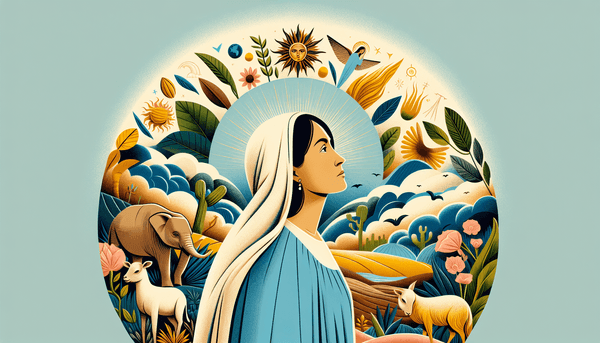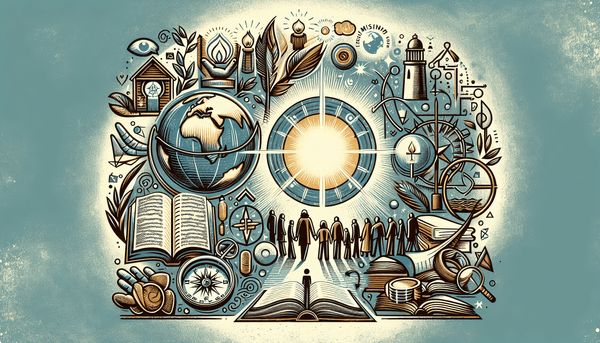Mary as the Mother of God
Among the most revered figures in Christianity is Mary, the mother of Jesus. The Bible presents Mary as a central character in the story of salvation. When the angel Gabriel appeared to her, he declared, 'You will conceive and give birth to a son, and you are to call him Jesus. He will be great and will be called the Son of the Most High' (Luke 1:31-32). This passage affirms Mary's unique role as the mother of Jesus, who is fully human and fully divine, making her the 'Mother of God' in the eyes of Christian theology. This belief is further supported by John 1:14, which speaks of the Word becoming flesh, and Galatians 4:4, which refers to God's Son being born of a woman. Mary's significance extends beyond her biological role, touching on the mysteries of the Incarnation and the divine plan for humanity's redemption.
The Nature of God in Christianity and Islam
Christianity and Islam both espouse monotheism, yet their understanding of God's nature diverges significantly. In Christianity, the belief in the Trinity, which includes the Father, Son, and Holy Spirit, is central. This is expressed in verses like Matthew 28:19, which instructs believers to baptize 'in the name of the Father and of the Son and of the Holy Spirit.' Conversely, Islam emphasizes the oneness of Allah, a concept encapsulated in the Quran's Surah Al-Ikhlas. Despite the shared terminology of 'God' in English and 'Allah' in Arabic, the theological differences are marked by the Christian doctrine of the Trinity, contrasting with the Islamic understanding of Tawhid. Deuteronomy 6:4 and John 10:30 capture the essence of the Christian perspective, affirming the unity and distinctiveness within the Godhead. For more insight into the richness of biblical themes, consider exploring our other article on wisdom, love, humility, and service.
The Book of Enoch and Its Place in Christian Tradition
The Book of Enoch, though not part of the canonical Bible, holds a place of historical and cultural interest. It is a collection of writings attributed to Enoch, the great-grandfather of Noah. The book has been influential in certain Jewish and Christian sects, but its exclusion from the canonical scriptures, as decided by early church fathers, means it is not considered authoritative in the same way as the books of the Bible. Its content, however, still offers valuable insights into early Jewish apocalyptic literature. The New Testament itself makes a single reference to the Book of Enoch in Jude 1:14-15, citing a prophecy attributed to Enoch. This serves as a testament to its lingering influence, despite its apocryphal status.
Enoch and His Significance in Biblical Narrative
The figure of Enoch stands out in the biblical narrative as a man of exceptional faithfulness. Mentioned in Genesis 5:24, Enoch was one of the few individuals who 'walked faithfully with God' and was taken to heaven without experiencing death. Hebrews 11:5 elaborates on his faith, stating that he was commended as one who pleased God. The life and translation of Enoch have long captivated theologians and believers alike, serving as a powerful symbol of divine approval and the potential for human beings to live in close communion with God. His story is a reminder that faith and righteousness can lead to an extraordinary destiny beyond the ordinary course of human experience.
FAQ
Q: Is killing bees considered a sin?
A: The Bible does not explicitly address the act of killing bees, but it does encourage us to treat all of God's creation with respect and kindness, suggesting that carelessly harming living creatures may not be in line with biblical teachings.
Q: Is Mary the mother of God?
A: Yes, in Christian theology, Mary is recognized as the mother of Jesus Christ, who is understood to be both fully human and fully divine, and therefore she is often referred to as the 'Mother of God.'
Q: What happened to the Book of Enoch?
A: The Book of Enoch is not included in the canonical Bible and is considered apocryphal, meaning it is not authoritative for matters of faith and practice in most Christian denominations, though it remains of historical and cultural interest.
Q: Who was Enoch?
A: Enoch was a figure from the Book of Genesis, described as a man who 'walked faithfully with God' and was taken to heaven without dying, a testament to his righteousness and faith.






